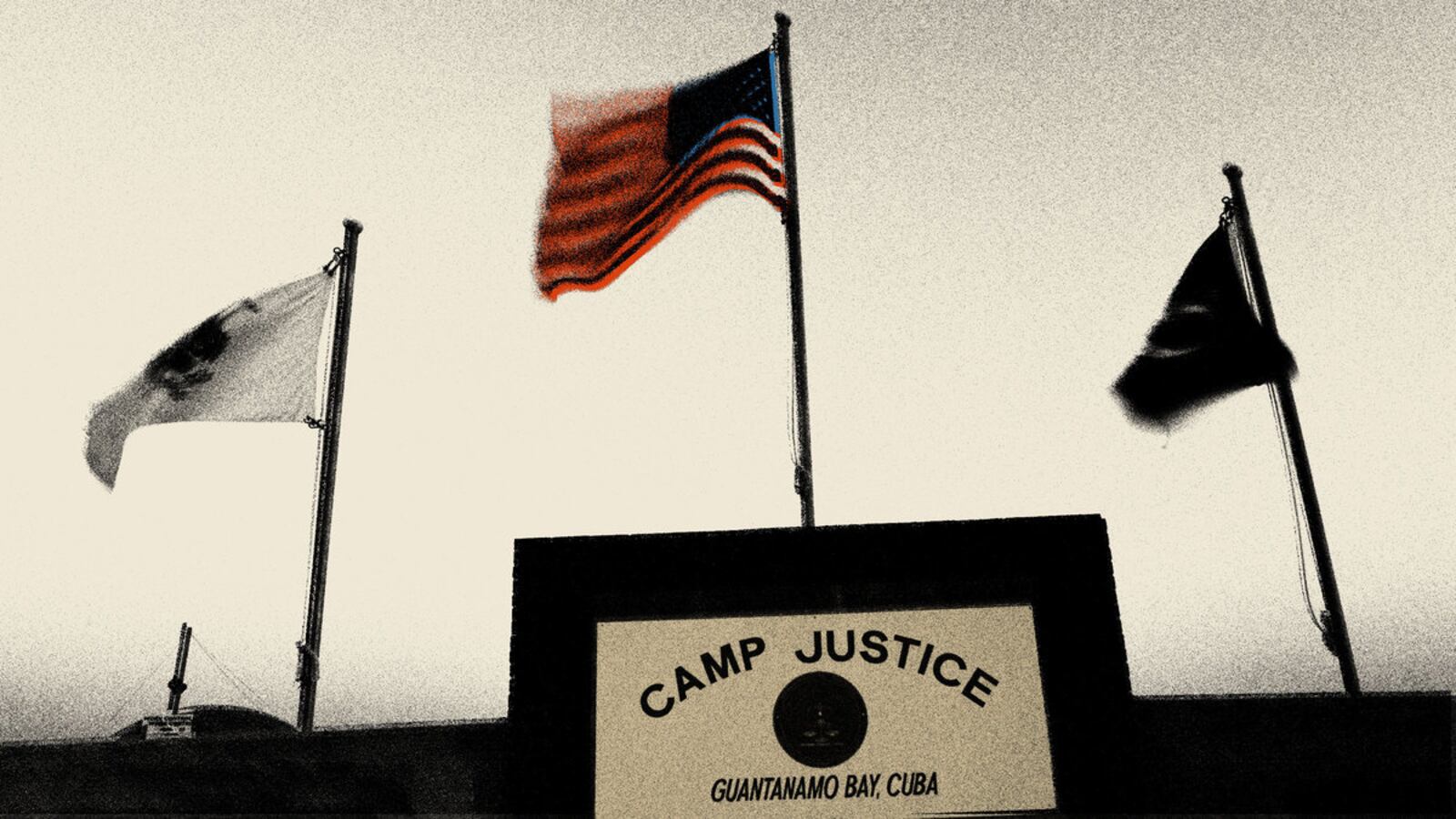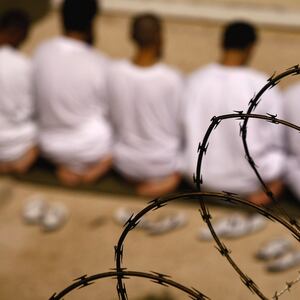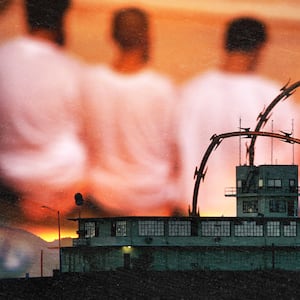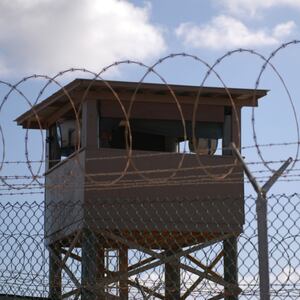When the U.S. government brought Mansoor Adayfi from Afghanistan to the Guantanamo Bay Detention Center in 2002 on the suspicion that he was working with al Qaeda, Adayfi told The Daily Beast he “couldn’t process what was happening.”
”The more we challenged, the more they cracked down,” Adayfi said, recounting grim details of his detention and alleged abuse at the hands of the U.S. government.
After 14 years of detention, the U.S. government determined Adayfi didn’t pose a threat to national security after all. The government found, in the end, it was “unclear whether he actually joined” al Qaeda.
He finally was able to leave Gitmo and resettle in Serbia in 2016.
Adayfi’s story is just one of hundreds of men who have been able to leave Guantanamo Bay, which is passing a grim milestone this week: its 20th anniversary.
But just as Adayfi couldn’t comprehend his detention at Guantanamo Bay when he was imprisoned there as a teenager, the continued operation of Guantanamo Bay to this day defies understanding. In many ways, not much has changed there, even as the global war on terror has evolved and even dissipated.
To Adayfi and countless other former detainees— as well as attorneys for detainees that still languish at the detention center—the fact that Gitmo remains open is an abomination.
President Joe Biden previously vowed to close it. The war in Afghanistan has ended, so the justification for keeping it open, many critics argue, has gone.
But 39 detainees are still imprisoned there—even though several of them have never been charged with a crime and are nowhere close to trial. Others still have been approved for transfer out of Guantanamo Bay, but still remain at the United States’ offshore prison, awaiting justice.
As then-President George W. Bush so deftly remembered just months after opening Guantanamo Bay in 2002: “Fool me once, shame on—shame on you. You fool me, we can’t get fooled again.”

A U.S. Army soldier stands at the entrance to Camp Delta where detainees from the U.S. war in Afghanistan live April 7, 2004 in Guantanamo Bay, Cuba.
Joe Raedle/GettyIt’s a trend Wells Dixon, senior staff attorney at the Center for Constitutional Rights, who has been representing Guantanamo Bay detainees for years, knows all too well.
”Guantanamo at 20 years is fundamentally the same as it was when I first went there 16 years ago to represent some of the detainees,” Dixon told The Daily Beast. “It’s a prison that still is reserved, at least in practice, exclusively for Muslim men, most of whom have been held without foreseeable end. It’s a place of tremendous human suffering. It’s a human rights disaster.”
Almost 800 men have passed through Gitmo to date, many of whom were tortured along the way, their cases flung at military commissions that human rights experts have long said violate fair trial requirements. And even though hundreds of men have been transferred out through the years, for those that remain at America’s offshore detention site, the cadence of transfers and their expectations that they’ll be treated fairly and receive due process is dwindling 20 years on.
”A lot of these men are like ghosts, they’re just trying to get by, trying to survive, day by day,” Dixon said. “And it really doesn’t matter whether they’re approved for transfer or facing military commission—for the most part they’ve been held for almost two decades, most without charge, and that’s had a devastating consequence for them. A lot of them don’t think that they’re ever going to be released from Guantanamo, they firmly believe that they’ll die there.”
Although successive administrations—including Donald Trump’s administration—have cleared innocent detainees to leave or transferred some out, U.S. government efforts to address the so-called high-value detainees, those the U.S. considered to have the most serious involvement with extremists, have been bogged down with procedural hurdles for years. A trial date for those accused of masterminding the 9/11 hijackings has been pushed back time and time again.
The longer the Biden administration lets prisoners fester at the offshore prison, the longer the United States runs the risk of feeding into extremist plots, according to Cliff Sloan, who served during the Obama administration as special envoy for Guantanamo’s closure at the State Department.
”Guantanamo undermines our security interests. In addition to being an affront to the rule of law, in addition to being outrageously expensive, it actually undermines our security,” Sloan told The Daily Beast. “It’s a recruiting tool for… those who are hostile to the U.S. and hostile to the West.”

Taliban prisoners in orange jumpsuits at Camp X-Ray at Naval Base Guantanamo Bay, Cuba on Jan. 11, 2002.
Shane McCoy/Greg Mathieson/Mai/GettyBut even for Biden, who has had the opportunity to start on a fresh footing, Gitmo seems to be more of the status quo than a time to chart a new path. In one stark example, instead of closing Guantanamo Bay, his administration is backing the construction of a new $4 million courtroom.
In comparison to former President Trump—who vowed to keep Guantanamo Bay open—even a moderate effort from this administration to cull through vestiges of the human rights screw-ups of the United States would make a world of a difference.
But the problems the United States created for itself in setting up Guantanamo Bay without human rights in mind are still here, intractable and haunting.
As the years have dragged on and details of the CIA’s torture program have slipped out, the government has tried burying evidence about CIA abuses, arguing the details of the torture, if revealed in court, would harm national security—a step that has, some say, prevented detainees from reaching any semblance of justice in court.
Part of the U.S. government’s problem stepping up to the plate and taking care of Guantanamo Bay once and for all is that doing so would mean confronting the human rights horrors and mistakes the country has made along the way, and that’s likely just too much to bear, said Clive Stafford Smith, the founder of Reprieve, a human rights organization that works on Guantanamo Bay cases and resettlement of detainees.
One of Stafford Smith’s clients, Ahmed Rabbani, is a case in point. Rabbani, whom the CIA tortured for more than 500 days before shipping him off to Guantanamo Bay, was scooped up and mistaken for an extremist by the name of Hassan Ghul. The CIA subjected him to Strappado, a medieval torture process meant to dislocate victims’ shoulders. The U.S. government eventually found the real Ghul and brought him to the same torture site—but to this day, Rabbani remains imprisoned at Guantanamo Bay, even though the U.S. government has cleared him for release.
”One of the enduring themes through this war on and of terror… is that we conflate what we call national security with political embarrassment,” Stafford Smith said. “The reason that they kept Ahmed and they tried to repress all the evidence as torture is not because it’s national security, it’s because it’s monumentally embarrassing that we did that in the 21st century.”
Some of the quagmire on the CIA’s torture program might be unwound at the Supreme Court in the coming days: justices have heard arguments in recent months in the case of Abu Zubaydah, the first prisoner the CIA held for torture, on whether disclosures on the torture program would actually harm national security.
The Biden administration has tried to block disclosures of the torture in court.
There are some glimmers of hope that detainees have to hold onto: They can get approved for transfer out of Guantanamo Bay by the U.S. government’s Periodic Review Board (PRB), which analyzes alleged threats Guantanamo detainees pose, and several detainees have been approved for transfer during the Biden administration.
Just this week Guled Hassan Duran, a high-value detainee at Guantanamo Bay, was informed he had been approved for transfer, his defense team told The Daily Beast in a call Monday. He is the first high-value detainee approved for transfer out. In its decision, the PRB said the review committee, “by consensus, determined that continued law of war detention is no longer necessary to protect against a continuing significant threat to the security of the United States” in his case, according to a determination document The Daily Beast obtained.
But the PRB—made up of representatives from several agencies including the Departments of Defense, State, and Homeland Security—made the determination last year, on November 10, 2021, according to the document.
It’s not clear why the U.S. government made the determination to free Duran, who has never been accused of a crime, but withheld that information from him.
“It’s cruel for the administration to decide that a person doesn’t need to be detained and not tell them, let alone not transfer them,” Dixon, part of Duran’s defense team, told the Daily Beast, adding that U.S. Government has not passed on any information yet about where Duran will be transferred or when that will take place.
When reached for comment, the Department of Defense and the PRB declined to comment at this time on the case.
Another detainee, Moath al-Alwi, who has never been charged with a crime, was also recently cleared for transfer by the PRB, according to a determination document obtained by The Daily Beast. His defense attorneys confirmed Tuesday he had been approved for transfer.
But again, the government gave him the green light last year, according to the determination document.
The Pentagon did not immediately return request for comment.
Even though the decisions on transfers is welcome news, it’s not common for the transfers to quickly come to fruition. Although the Biden administration has said several detainees don’t have reason to remain at Gitmo, the administration has only transferred out one detainee so far.
One transfer per year isn’t nearly enough to clear out Gitmo by the end of Biden’s presidency, Dixon said.
In other ways, too, the Biden administration hasn’t been doing much when it comes to transfers. The U.S. government has continued the same old slipshod, backstabbing job of previous administrations: the government actively recommends detainees for transfer one day, and then turns on them the next and argues in court for their continued imprisonment.
For those that have left Guantanamo Bay, life has never been the same.
”When I talk about life after Guantanamo, I call it Guantanamo 2.0,” Adayfi told The Daily Beast. “It’s not life after Guantanamo. We live in the shade of Guantanamo, the stigma.”
The torture so many former detainees suffered has lasting scars, too.
Binyam Mohamed, who was tortured for 18 months, has tried to describe his torture to his attorney, Stafford Smith, but found often he couldn’t convey emotions along with his recollections of the abuse, Stafford Smith told The Daily Beast.
”He said, ‘I’m kind of dead in the head, you’re going to have to fill in the emotion,’” Stafford Smith recounted. “It’s very hard for people to talk emotionally about something that’s just so barbaric.”
Adayfi said his advice to those getting approved for transfers is to do their best to gather support systems for their chapter after Guantanamo Bay.
“I would say… please leave Guantanamo behind you and do not live at Guantanamo, don’t let Guantanamo [take you] twice,” Adayfi said. “Guantanamo was a stage, a station, in your life—move to the next. It is easy to say that, but to do it, you need time.”
For some detainees, though, their fate may not be in their hands at all. Overall, 30 percent of former Guantanamo Bay detainees aren’t granted legal status in their new countries, according to Reprieve data released this week.
A handful of released Guantanamo detainees that were transferred to the United Arab Emirates in recent years, for instance, were promised jobs and reintegration to society. Instead, they were sent to a prison notorious for torture, according to the Associated Press. The UAE has also reportedly deported some former detainees. Some of the men have been tortured and subject to ill-treatment since, according to a UN report.
Of course, it doesn’t have to be this way.
The key to managing these kinds of transfers and resettlements more appropriately, is setting up a special envoy role on closure, said Sloan. Although the Obama administration had a special envoy on Guantanamo closure, Trump dismantled the office. The Biden administration has expressed interest in reopening it, but still hasn’t done so—a mistake Sloan said should be promptly remedied.
”There frequently can be voices of sort of fatalism and negativism suggesting that nothing can be done. And that is just dead wrong. It is a solvable problem,” Sloan, the former closure special envoy, told The Daily Beast. “It simply requires the will and determination to move forward on it.”
Biden has blamed Congress for roadblocks to closure in recent weeks, including provisions in the latest National Defense Authorization Act that block the government from transferring detainees to the U.S. But Dixon claimed the administration has all the authority it needs to close the offshore prison.
“Congress has certainly made it more logistically burdensome to transfer men out of Guantanamo by enacting a series of restrictions on transfers. But the Biden administration has all of the legal authority it needs today to close Guantanamo,” Dixon said. “It is politically convenient for the Biden administration to point its finger at Congress and say [it’s] the reason we haven’t.”
Congress isn’t fully exonerated, though.
According to Sloan, one step that would speed along closure efforts “that cannot be done under current law is bringing people to the U.S. even for imprisonment in very secure facilities.”
“That makes absolutely no sense,” Sloan said. “I think that law should be changed.”
But those restrictions likely aren’t going to be lifted anytime soon, a congressional aide familiar with the process told The Daily Beast.
”I don’t expect a change in those transfer certification and restrictions in the near term,” the congressional aide said.
“Yes, Congress has been difficult, but that doesn’t explain policy incoherence. The Biden administration doesn’t have its act together on closing Guantanamo. The administration is doing things on a day by day basis that undermine the closure of Guantanamo,” Dixon said. “It’s a failure of leadership.”












